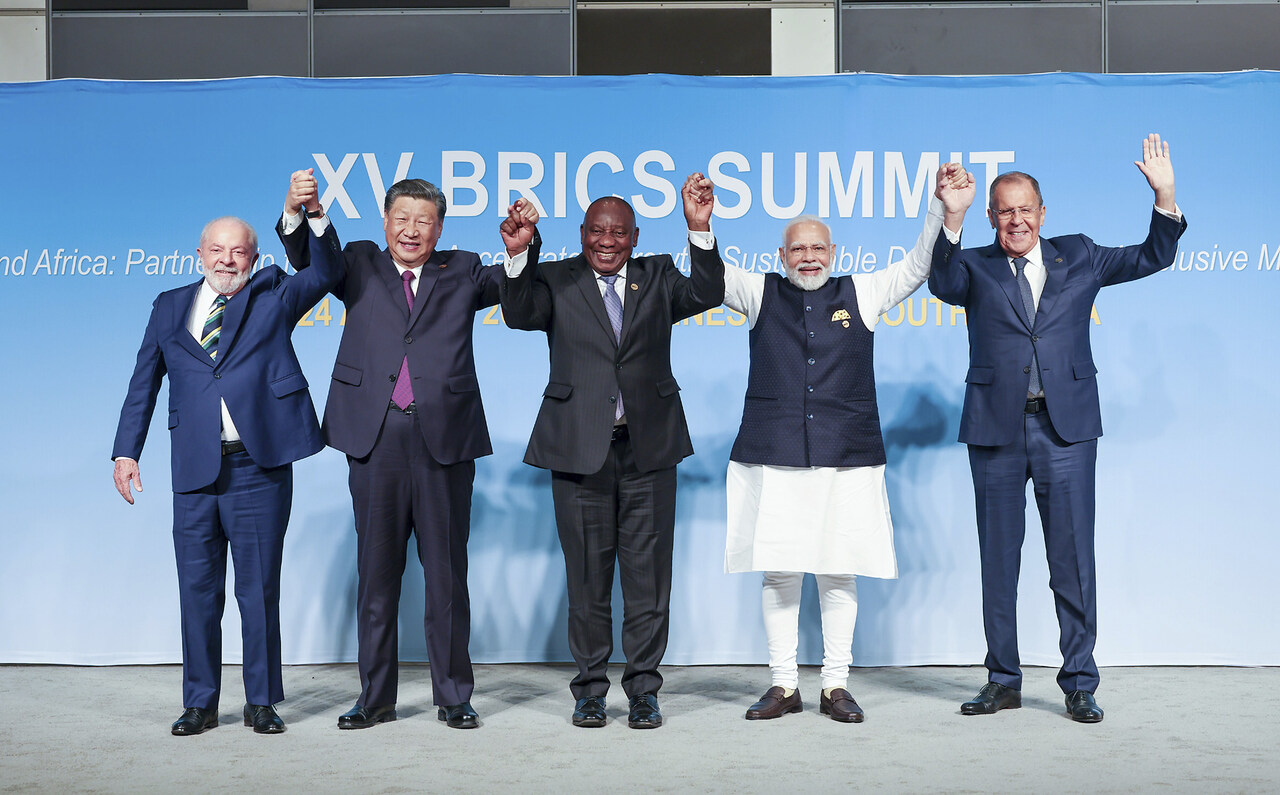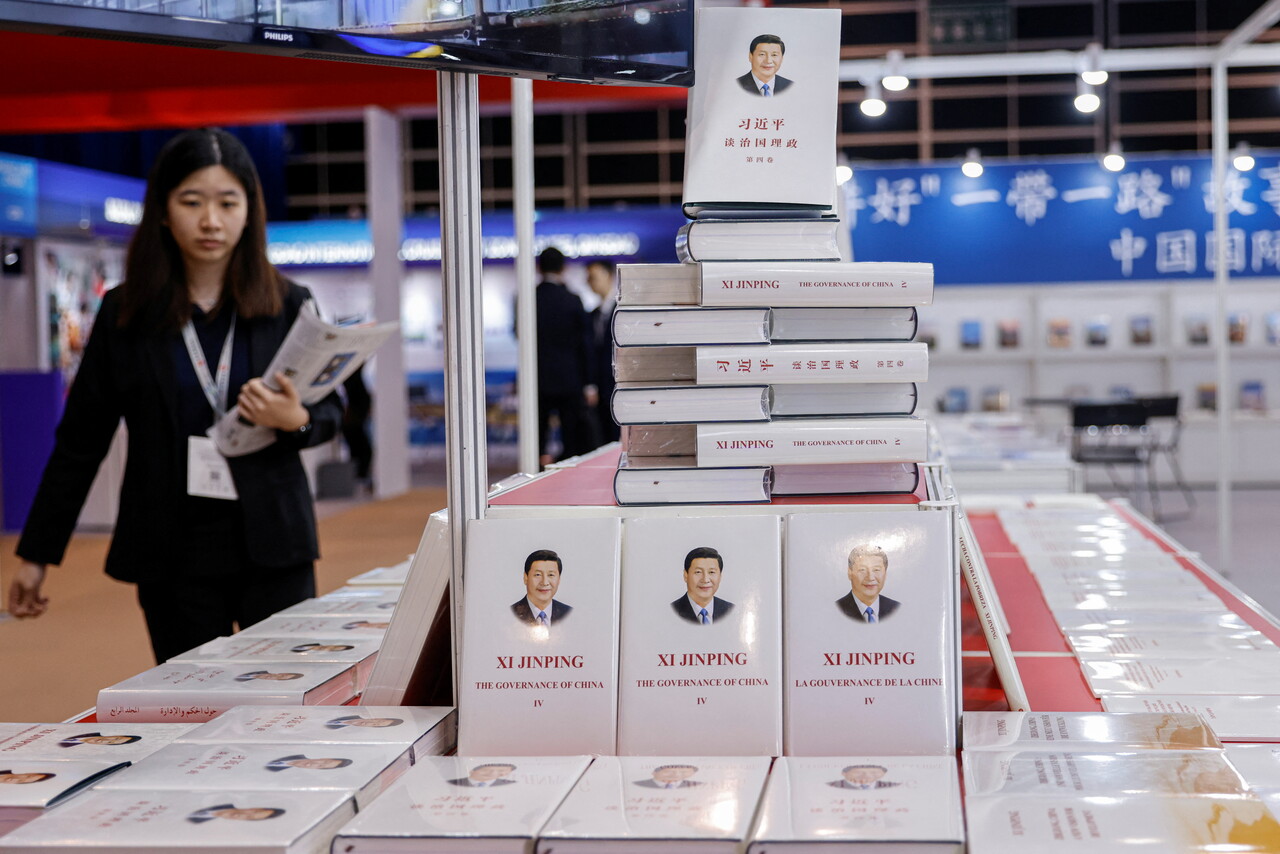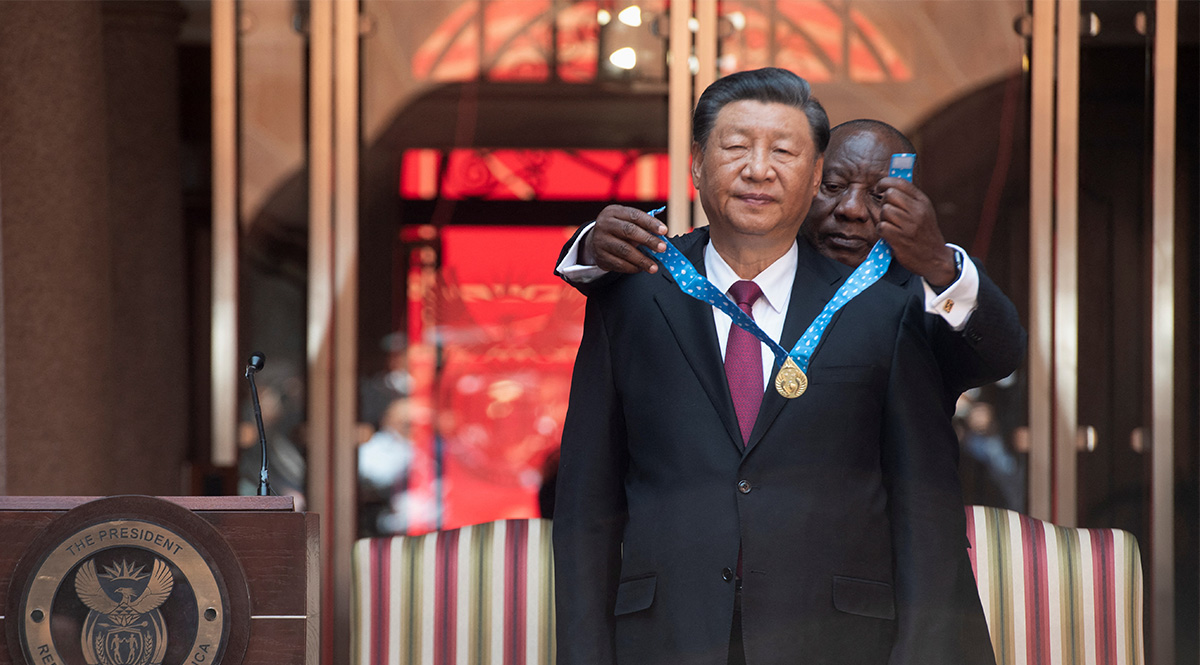China Building Up BRICS as Important Foreign Policy Tool
BRICS is useful for China in its rivalry with the U.S., mainly as a tool to influence developing countries. It is also an important element of strategic cooperation with Russia and a platform for dialogue with India. China does not care about BRICS integration, instead it wants to consolidate the group’s participants to further China’s goals.. The EU’s response to this should include effective support for developing countries and a subjective approach to their demands for global governance.
.png) Kirill Zykov/Brics-Russia2024.Ru / Zuma Press / Forum
Kirill Zykov/Brics-Russia2024.Ru / Zuma Press / Forum
Since its inception in 2009, China sees it as an alternative to other groupings cantered on Western countries. China’s Chairman at that time Hu Jintao, along with the leaders of Brazil, Russia, and India, attended the first BRIC summit in 2009 in Yekaterinburg, Russia. In December 2010, South Africa formally joined, and in 2011, at the third meeting of the format’s leaders, held in China, it was the first new state to participate. The platform was then renamed “BRICS”.
As China’s relations with developing countries grew in importance and its rivalry with the U.S. intensified, the Chinese authorities increasingly saw BRICS as a useful tool of their foreign policy. They have supported the expansion of cooperation with such countries, for example, with the establishment in 2015 of the New Development Bank (NBR). China has also advocated increasing the number of participants in the format. As of January 2024, primarily as the result of Chinese efforts, four new countries have joined the platform, Egypt, Ethiopia, Iran, and the United Arab Emirates, forming “BRICS+”. In January 2025, Indonesia joined the group. In 2024, at its Kazan summit, the group established “BRICS partner” status, granting it to 12 countries—Algeria, Bolivia, Belarus, Cuba, Vietnam, Kazakhstan, Malaysia, Nigeria, Thailand, Turkey, Uganda, and Uzbekistan—as of January this year.
Political Dimension
Beginning with the group’s summit in 2019, China has been emphasising the importance of political and security cooperation. Significant elements include exchanges of experience, military dialogues, and even joint exercises or training with platform participants, comprising aspects of its rivalry with the U.S. China’s Chairman Xi Jinping, at successive summits of the format, including in Kazan in 2024, has stressed that the new participant countries in BRICS+ serves to build a “just and rational” international order. He also has highlighted the importance of the Global South and points to Chinese cooperation formats, such as the Global Development Initiative (GDI) and Global Security Initiative (GSI), as especially significant. The Chinese authorities have made clear that BRICS is useful for the promotion of these options for cooperation. The format is also helpful to pushing for the Sino-Brazilian concept, announced in September 2024, of negotiations for an end to the war in Ukraine that was supported by Indonesia, Egypt, South Africa, and others. The concept puts the security interests of Russia as equal to Ukraine’s, constituting an opposing process to the Ukrainian peace formula. This makes it an example for the use of the platform as part of China’s strategic cooperation with Russia.
The political importance of BRICS to China is growing with the number of participants. They are bound together mainly by dissatisfaction and insecurity stemming from the policies of the United States and its partners. As analysed, for example, by experts from the Chinese University of Hong Kong or Fudan University, these sentiments drive China’s cooperation with the countries of the Global South towards the formation of a “new world order”, one that ultimately us to compete with current international formats like the G7. This may be indirectly confirmed in October 2024 speech by Chinese Foreign Minister Wang Yi, who stated that a feature of BRICS is inclusiveness, as opposed to “cliques” characterised by a “Cold War mentality”. Through BRICS, China seeks support for its demands (e.g., taking over Taiwan, possibly by force) but also influences the politics of these countries, including through cooperation between political parties, education of activists, and exchanges of scientists and students. This is also reflected in, among other things, joint military exercises (e.g., in February 2023, with the participation of units from Russia, China and South Africa) and the cooperation of participant states’ research and scientific institutions under the leadership of the Chinese Communist Party’s Central Committee’s International Department. China’s strong position in the group is facilitated by its economic and political potential, as well as the lack of permanent BRICS organisational structures. This means that countries with newer memberships, unless they host a leaders’ summit, have limited influence over the choice of detailed directions of cooperation.
China’s involvement in BRICS also provides a platform for dialogue with India, which is important given their strained relations in recent years. In addition to face-to-face interactions (such as the meeting between China’s Xi Jinping and India’s Narendra Modi held at the Kazan summit on its sidelines), it gives China an opportunity to present BRICS as a pluralistic format in which opposition to the West is not the only element connecting its participants.
Economic Significance
Although economic cooperation within the platform is of secondary importance to China (not least because of the differing levels of economic development of the BRICS countries) vis-à-vis the political dimension, it plays a supporting role to the development of political relations. According to declarations, China, as well as BRICS as a whole, opposes protectionism in international trade or restrictions on economic cooperation, accusing the EU and the U.S. of such actions. An expression of this approach is the Chinese proposals for a greater role for developing countries in global economic governance, made at the 2017 Xiamen, China, summit.
China supports integration projects of an economic nature in BRICS, such as the use of local currencies in trade and the creation of financial settlement mechanisms separate from Western ones. In a speech at the 2024 Kazan summit, Xi identified innovation, green technology, and sustainable development as the most important areas. The meeting statement, however, made only a general reference to economic goals, including the debt problem of developing countries, NBR investment in countries of the Global South, and food trade facilitation. It also established, under the informal leadership of China, a BRICS study group on the development of artificial intelligence.
Conclusions and Outlook
BRICS is one of the most important instruments for China to achieve its foreign policy goals, including in particular those involving the rivalry with the U.S. and influencing EU policy. China’s power allows it to persuade the group’s members more strongly than, for example, the G20.
Due to the intensive development of BRICS in recent years, inspired also by China, the platform has become an important forum for promoting Chinese initiatives. Their goal is to expand markets and increase investment opportunities (e.g., via the GDI), but above all to strengthen political and security cooperation (which applies to the GSI). China’s policy in this regard is bearing fruit, given the growing interest of developing countries in participating in BRICS meetings. It may continue to be effective given the unilateralism of current U.S. foreign policy. President Donald Trump’s threats to impose 100% tariffs on countries seeking to reduce the dollar’s role in international trade, aimed in part at BRICS countries, have not stopped countries like Indonesia and Nigeria from participating in the format’s meetings. Rather, they may be reinforcing China’s perception of BRICS as an alternative to Western cooperation platforms (e.g., the G20) and a valuable mechanism for consolidating the countries of the Global South. This is visible in Chinese and Russian activity at the UN, evidenced by the participation of the UN Secretary General in the Kazan Summit.
For the EU, the promotion of China’s vision of an international order dominated by the largest states is the main threat posed by BRICS as a format. This includes the spread of the Sino-Russian narrative about international security, including in Europe. This requires the EU to strengthen cooperation with developing countries. It is important to point out the consequences for this group of countries of violations of international law, including the increased threat of aggression by more powerful actors. The basis of the EU’s relations with partners in Asia, Africa, or Latin America, however, should not be criticism of BRICS, giving the format’s growing importance, but instead offering a positive message concerning the political sphere (e.g., a willingness to support a greater role for them in international organisations), the economy, and in other areas. More effective implementation of the Global Gateway initiative in response to the development needs of these countries may be useful here. Beneficial cooperation also may be fostered by the shared concerns of the EU and developing countries about Chinese overcapacity exports and protection from other unfair Chinese trade practices.





